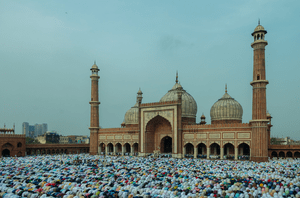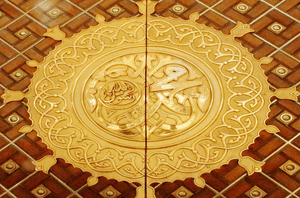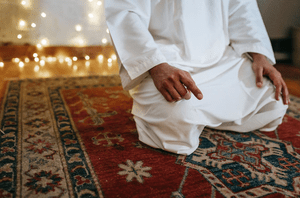The Etiquettes of Going to the Masjid
The etiquettes of attending the masjid are a crucial preparation for ṣalāh. Adhering to these is indicative of the respect and esteem you accord ṣalāh in your heart. They will also prepare you psychologically for your standing in front of the Supreme Creator.
a) Perform wuḍū thoroughly in accordance to the sunnah at home
The Messenger of Allah ﷺ said, “No man purifies himself, and does it thoroughly, then goes to the masjid, except that Allah records a good deed for him for every step he takes, raises him a degree for it, and wipes away a sin from him for it” (Muslim).
b) Avoid smelling foul
The Messenger of Allah ﷺ said, “Whoever has eaten garlic, onion or leek should stay away from our masjid, for indeed the angels are troubled by what the children of Ādam are troubled by” (Muslim).
c) Beautify yourself
Allah (‘azza wa jall) said, “O Children of Ādam, beautify yourselves at every masjid” (7:31). The Prophet ﷺ said, “Indeed Allah is Beautiful and loves beauty” (Muslim). Apply perfume (men only), and wear clean and appropriate clothing to the masjid.
d) Say the duʿā’ for leaving the house and the duʿā’ for walking to the masjid
When Leaving the Home #1
بِسْمِ اللهِ تَوَكَّلْتُ عَلَى اللهِ ، لَا حَوْلَ وَلَا قُوَّةَ إِلَّا بِاللهِ
Bismi-llāhi tawakkaltu ʿalal-llāh, lā ḥawla wa lā quwwata illā bi-llāh.
In the Name of Allah, I have placed my trust in Allah. There is no power (in averting evil) or strength (in attaining good) except through Allah. (Abū Dāwūd 5095, Tirmidhī 3426)
When Leaving the Home #2
اَللّٰهُمَّ إِنِّيْ أَعُوْذُ بِكَ أَنْ أَضِلَّ أَوْ أُضَلَّ ، أَوْ أَزِلَّ أَوْ أُزَلَّ ، أَوْ أَظْلِمَ أَوْ أُظْلَمَ ، أَوْ أَجْهَلَ أَوْ يُجْهَلَ عَلَيَّ
Allāhumma innī aʿūdhu bika an aḍilla aw uḍalla, aw azilla aw uzalla, aw aẓlima aw uẓlama, aw ajhala aw yujhala ʿalayy.
O Allah, I seek Your protection from misguiding others or being misguided; from erring or others causing me to err; from oppressing others or being oppressed; and from acting ignorantly or others acting ignorantly towards me.
Whilst Going to the Masjid
اَللّٰهُمَّ اجْعَلْ فِيْ قَلْبِيْ نُوْرًا ، وَفِيْ بَصَرِيْ نُوْرًا ، وَفِيْ سَمْعِيْ نُوْرًا ، وَعَنْ يَّمِيْنِيْ نُوْرًا ، وَعَنْ يَّسَارِيْ نُوْرًا ، وَفَوْقِيْ نُوْرًا ، وَتَحْتِيْ نُوْرًا ، وَأَمَامِيْ نُوْرًا ، وَخَلْفِيْ نُوْرًا ، وَاجْعَلْ لِيْ نُوْرًا
Allāhumma-j-ʿal fī qalbī nūrā, wa fī baṣarī nūrā, wa fī samʿī nūrā, wa ʿay-yamīnī nūrā, wa ʿay-yasārī nūrā, wa fawqī nūrā, wa taḥtī nūrā, wa amāmī nūrā, wa khalfī nūrā, wa-j-ʿal lī nūrā.
O Allah, place light in my heart, light in my sight and light in my hearing. Place light on my right and place light on my left. Place light above me and place light beneath me. Place light in front of me, place light behind me and grant me light. (Bukhārī 6316, Muslim 763)
e) Walk with calmness and serenity
The Messenger of Allah ﷺ said, “When you hear the iqāmah, walk to prayer with calmness and dignity, and do not hurry. Pray whatever you are able to pray and complete whatever you miss” (Bukhārī).
f) Enter the masjid with your right foot and recite the duʿā’
When Entering the Masjid #1
أَعُوْذُ بِاللهِ الْعَظِيْمِ ، وَبِوَجْهِهِ الْكَرِيْمِ ، وَسُلْطَانِهِ الْقَدِيْمِ ، مِنَ الشَّيْطَانِ الرَّجِيْمِ
Aʿūdhu bi-llāhi-l-ʿaẓīm, wa bi wajhihi-l-karīm, wa sulṭānihi-l-qadīm, mina-sh-Shayṭāni-r-rajīm.
I seek protection in Allah, the Supreme, His Noble Countenance, and His Eternal Authority from the accursed Shaytān. (Abū Dawūd 466)
When Entering the Masjid #2
بِسْمِ اللهِ ، وَالصَّلَاةُ وَالسَّلَامُ عَلَىٰ رَسُوْلِ اللهِ ، اَللّٰهُمَّ اغْفِرْ لِيْ ذُنُوْبِيْ ، اَللّٰهُمَّ افْتَحْ لِيْ أَبْوَابَ رَحْمَتِكَ
Bismi-llāh, wa-ṣ-ṣalātu wa-s-salāmu ʿalā Rasūl-i-llāh, Allāhumma-ghfir lī dhunūbī, Allāhumma-f-taḥ lī abwāba raḥmatik.
In the Name of Allah. Peace and blessings be upon the Messenger of Allah. O Allah, forgive my sins. O Allah, open the gates of Your mercy for me. (Composite: Ibn al-Sunnī 88, Abū Dawūd 465, Ibn Mājah 771, Muslim 713)
g) Perform taḥiyyat al-masjid
The Messenger of Allah ﷺ said, “When one of you enters the masjid, he should not sit until he has prayed two rakʿāhs” (Bukhārī).
h) Go early so that you can sit in the first row and preferably at the right side of the imām.
The Messenger of Allah ﷺ said, “If the people knew what is the reward of announcing the call for the prayer and of being in the first row (in the congregation), and then they found no other way to get this privilege except by casting lots, they would certainly cast lots for it” (Bukhārī).
He ﷺ also said, “Indeed Allah and His Angels send blessings on the right side of the rows” (Abū Dāwūd).
i) Make the intention to wait for ṣalāh
The Messenger of Allah ﷺ said, “The servant is constantly in prayer so long as he is in his place of worship waiting for the prayer. The Angels say, ‘O Allah, pardon him. O Allah, have mercy upon him…’” (Muslim).
j) Exit the masjid with your left foot and recite the duʿā’
Ibn ʿUmar (radiy Allāhū ‘anhumā) used to enter with his right foot first and exit with his left foot first (Bukhārī).
When Leaving the Masjid #1
بِسْمِ اللهِ ، وَالصَّلَاةُ وَالسَّلَامُ عَلَىٰ رَسُوْلِ اللهِ ، اَللّٰهُمَّ إِنِّيْ أَسْأَلُكَ مِنْ فَضْلِكَ
Bismi-llāh, wa-ṣ-ṣalātu wa-s-salāmu ʿalā rasūl-illāh, allāhumma innī as’aluka min faḍlik.
In the Name of Allah. Peace and blessings be upon the Messenger of Allah. O Allah, I ask You from Your bounty. (Composite: Ibn Mājah 771, Ibn al-Sunnī 88, Muslim 713)
When Leaving the Masjid #2
اَللّٰهُمَّ اعْصِمْنِيْ مِنَ الشَّيْطَانِ الرَّجِيْمِ
Allāhumma-ʿṣimnī mina-sh-shayṭāni-r-rajīm.
O Allah, protect me from the rejected Shaytān. (Ibn Mājah 773)
Absorb the Adhān into Your Heart
Always hearing a particular sound can make us indifferent to it. As it melds into the background, we may fail to appreciate its significance.
Imām al-Ghazālī (raḥimahullāh) explains that on hearing the mu’addhin’s call to prayer, remind yourself about how terrifying the call for the Day of Judgement will be. Be eager and prepare yourself physically and spiritually for this call (i.e. the adhān) in this world. If you are of those who hastened to respond to this call in this world, then know that your name will be called out gently on that Terrifying Day.
Another feeling you may experience whilst listening to the adhān is calm and joy. Ibn al-Qayyim (raḥimahullāh) explains that if your heart leaps with joy when you hear the adhān in the dunyā, then only bliss and triumph will accompany your ‘call’ on the Day of Reckoning. It is for this reason that the Prophet ﷺ said, “Bilāl, give us comfort through ṣalāh” (Aḥmad). As his happiness lay in ṣalāh, he was eager to enter it and would ask Bilāl (raḍiy Allāhu ‘anhu) to commence it by delivering the adhān.
Respond to the Adhān
Responding attentively to the mu’adhdhin while contemplating on the inner and deeper meanings of the words will help you attain khushūʿ in your ṣalāh:
| After the Mu’addhin says… | You say… |
|---|---|
| اللهُ أَكْبَرُ (Allah is the Greatest.) | اللهُ أَكْبَرُ (Allah is the Greatest.) |
| أَشْهَدُ أَنْ لَّا إِلٰهَ إِلَّا اللهُ (I bear witness that there is no god worthy of worship except Allah.) | أَشْهَدُ أَنْ لَّا إِلٰهَ إِلَّا اللهُ (I bear witness that there is no god worthy of worship except Allah.) |
| أَشْهَدُ أَنَّ مُحَمَّدًا رَّسُوْلُ اللهِ (I bear witness that Muḥammad is the Messenger of Allah.) | أَشْهَدُ أَنَّ مُحَمَّدًا رَّسُوْلُ اللهِ (I bear witness that Muḥammad is the Messenger of Allah.) |
| حيَّ عَلَى الصَّلَاة (Come to Ṣalāh.) | لَا حَوْلَ وَلَا قُوَّةَ إِلَّا بِالله (There is no power to achieve good or might to avert evil except through Allah.) |
| حَيَّ عَلَى الْفَلَاح (Come to success.) | لَا حَوْلَ وَلَا قُوَّةَ إِلَّا بِالله (There is no power to achieve good or might to avert evil except through Allah.) |
| اللهُ أَكْبَرُ اللهُ أَكْبَرُ (Allah is the Greatest, Allah is the Greatest.) | اللهُ أَكْبَرُ اللهُ أَكْبَرُ (Allah is the Greatest, Allah is the Greatest.) |
| لَا إِلٰهَ إِلَّا اللهُ (There is no god worthy of worship except Allah.) | لَا إِلٰهَ إِلَّا اللهُ (There is no god worthy of worship except Allah.) |
1)
The Messenger of Allah ﷺ instructed us to repeat the words of the mu’adhdhin during ṣalāh. This is with the exception of the following phrase “…when he says حيَّ عَلَى الصَّلَاة ، حَيَّ عَلَى الْفَلَاح, say: لَا حَوْلَ وَلَا قُوَّةَ إِلَّا بِالله. If he says it from his heart, he shall enter Paradise” (Muslim).
Al-Ṭībī (raḥimahullāh) wrote, “The meaning of حيَّ عَلَى الصَّلَاةِ ، حَيَّ عَلَى الْفَلَاحِ is come with your exterior and interior to guidance and triumph immediately. Therefore, it is only appropriate that one (responds to this) by saying that this is a great matter which – due to my weakness – I am unable to carry out unless Allah (‘azza wa jall) allows me to, through His might and power.”
The phrase لَا حَوْلَ وَلَا قُوَّةَ إِلَّا بِالله is one of the treasures of Paradise (Tirmidhī). Imām al-Nawawī (raḥimahullāh) explains that this is because it embodies complete submission, the entrusting of one’s affairs and true obedience of Allah. Thus, this phrase acknowledges that Allah is the only Creator and none can turn back His Command, and that the slave is powerless in his own affairs.
What does لَا حَوْلَ وَلَا قُوَّةَ إِلَّا بِالله mean?
A slave cannot move from one situation to another (ḥawl), nor does he have the strength (quwwah) to do this except by the will and help of Allah (‘azza wa jall).
There is no power to stop sinning/avert evil, nor is there any strength to be obedient/attain good except by the will and help of Allah.
After the Adhān
Following the completion of the adhān, recite the following phrases (in this order):
2)
وَأَنَا أَشْهَدُ أَنْ لَّا إِلٰهَ إِلَّا اللهُ وَحْدَهُ لَا شَرِيْكَ لَهُ ، وَأَنَّ مُحَمَّدًا عَبْدُهُ وَرَسُوْلُهُ ، رَضِيْتُ بِاللهِ رَبًّا ، وَبِمُحَمَّدٍ رَسُوْلًا ، وَبِالْإِسْلَامِ دِيْنًا
I also bear witness that there is no god worthy of worship but Allah. He is Alone and He has no partner whatsoever, and that Muḥammad ﷺ is His servant and His Messenger. I am satisfied with Allah as my Lord, with Muḥammad as my Messenger, and with Islam as my religion.
The Messenger of Allah ﷺ said, “If anyone says [the above] on hearing the mu’adhdhin, his sins will be forgiven” (Muslim).
3)
اَللّٰهُمَّ صَلِّ عَلَىٰ مُحَمَّدٍ ، وَعَلَىٰ آلِ مُحَمَّدٍ…
The Messenger of Allah ﷺ said, “When you hear the mu’adhdhin calling for the prayer, repeat his words then send blessings upon me. The one who sends blessings upon me once, Allah will send 10 blessings upon him” (Muslim).
4)
اَللّٰهُمَّ رَبَّ هٰذِهِ الدَّعْوَةِ التَّامَّةِ وَالصَّلَاةِ الْقَائِمَةِ ، آتِ مُحَمَّدًا الْوَسِيْلَةَ وَالْفَضِيْلَةَ ، وَابْعَثْهُ مَقَامًا مَّحْمُوْدًا الَّذِيْ وَعَدْتَّهُ
O Allah, Lord of this perfect call and established prayer, grant Muḥammad the status (the highest station in Paradise) and pre-eminence (superiority over the rest of the creation), and resurrect him to the praiseworthy station that You have promised him.
The Messenger of Allah ﷺ said, “Whoever says [the above] after the adhān shall receive my intercession on the Day of Judgement” (Bukhārī).
5)
After the adhān and before the iqāmah you should make duʿā’, as the Messenger of Allah ﷺ said, “Duʿā’ is not rejected between the adhān and the iqāmah” (Tirmidhī).
5 FOR 5
- Glad tidings of Paradise.
- Forgiveness of all sins.
- Ten blessings from Allah.
- Intercession of the Prophet
- Acceptance of duʿā’.
After al-Rabīʿ b. Khuthaym (raḥimahullāh) became partially paralysed, he used to go to the Masjid helped by two men. It was said to him, “O Abū Yazīd! You may pray at home, as you are excused.” He said, “Whoever hears حَيَّ عَلَى الْفَلَاح should answer it even by crawling.”






